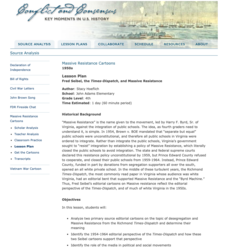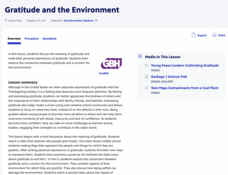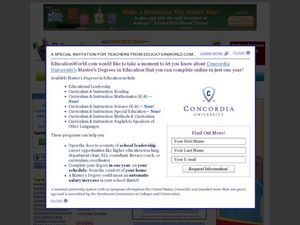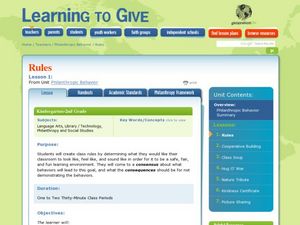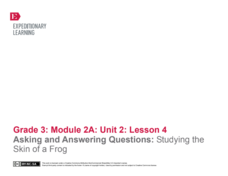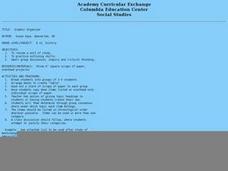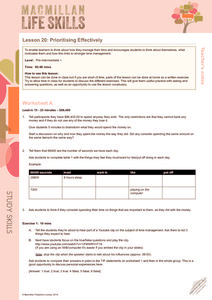Curated OER
Reaching Your Potential - Personal Development
How do young people know the potential they possess? Middle schoolers explore their personal potential through two different activities and a class discussion. They examine where their aptitudes lie, and how they can use their gifts to...
Missouri Department of Elementary
Respect for Self and Others—Giving and Getting the Big R
Tween find out what it means to give and get respect. After reviewing the Recipe for Relationships studied in a previous lesson plan, groups create a dramatization of two-minute scenario in which an individual behaves inappropriately in...
Macmillan Education
Skills and Attitudes
What kinds of skills and attitudes are valued in a work environment? Using this set of worksheets and collaborative activities, your pupils will develop important life skills and consider what is necessary for getting and keeping a job.
Illustrative Mathematics
How Thick Is a Soda Can II?
Science, technology, and math come together in this one combination exercise. Analyzing the common soda can from both a purely mathematical perspective and a scientific angle allows for a surprisingly sophisticated comparison of...
Computer Science Unplugged
Conversations with Computers—The Turing Test
Will the real computer please stand up? The premise of this activity is for the class to ask questions to a human and to a computer and to determine which is which. The class asks a given set of questions, and the person playing the role...
Roy Rosenzweig Center for History and New Media
Fred Seibel, the Times-Dispatch, and Massive Resistance
A lesson plan challenges scholars to analyze editorial cartoons created by Fred Seibel, illustrator for the Times-Dispatch, during the Massive Resistance. A class discussion looking at today's editorial pages and Jim Crow Laws leads the...
PBS
Gratitude and the Environment
A class discussion begins a two-part lesson about gratitude and the environment. In part one, learners watch a video then share their feelings about its most memorable moment. Delving deep into the meaning of gratitude, scholars create...
EngageNY
What Is Area?
What if I can no longer justify area by counting squares? Lead a class discussion to find the area of a rectangular region with irrational side lengths. The class continues on with the idea of lower approximations and upper...
University of Waikato
Estuary Metaphors
Mixing metaphors into science. To begin, the instructor leads a discussion about estuaries to determine what the class already knows. Working in small groups, pupils determine how a selected object is similar to an estuary, how it...
Curated OER
Home Living / Daily Living: Nail Care
Nails can get really dirty really fast. Prepare your special education class for life on their own by introducing them to a regular nail care routine. They discuss why it is important to care for your nails and practice washing,...
Curated OER
Good Sportsmanship Leads to Home Run
Pupils share examples of good sportsmanship, then read a news article about a team helping an injured player score a home run. The teacher introduces the article with a discussion and vocabulary activity, then students read the news...
EngageNY
From Ratio Tables to Double Number Line Diagrams
How much sugar is in one bottle? Pupils use double number line diagrams to determine the amount of sugar in a 1L bottle of cola. The teacher leads a discussion on ways that double number lines can be of assistance in solving a problem...
Curated OER
Informative Essay Writing
High schoolers start by drawing Mr. Essay Man, who is supposed to illustrate the different parts of an essay. After discussing what each component should contain, writers start their essay, guided by the teacher and class discussion....
Brigham Young University
A River Runs Through It: Blooms Taxonomy
Designed for teachers who use Norman Maclean's autobiographical A River Runs Through It, this one-page resource offers discussion question structured using Bloom's Taxonomy.
Virginia Department of Education
z-Scores
Just how far away from the mean is the data point? Pupils calculate the standard deviation for a set of data and find out how many standard deviations a point is away from the mean. The teacher leads a discussion on how to calculate...
Equality and Human Rights Commission
Learning area 2: Challenging Stereotypes and Discrimination
Six powerful and eyeopening lessons provide scholars with activities designed to challenge stereotypes and discrimination. The unit provides reading material with which pupils read and discuss. Grand conversations lead to physically...
Illustrative Mathematics
Introduction to Linear Functions
Introduce your algebra learners to linear and quadratic functions. Learners compare the differences and relate them back to the equations and graphs. Lead your class to discussions on the properties of a function or a constant slope...
Virginia Department of Education
Determining Direct Variation
Once learners realize what direct variation is, they see it's just a type of linear function. The lesson poses a general question that leads to the creation of the y = kx formula. The resource includes discussion prompts and ideas for...
Gobal Oneness Project
A Tapestry of Multicultural Diversity
New York City is a perfect place to begin a study of multicultural diversity. The largest and the most culturally diverse city in the United States provides the backdrop for a photo essay that features images of cultural and religious...
Curated OER
Philanthropic Behavior
Youngsters create class rules by determining the environment they would like to have in their classroom. They come to a consensus about how to have a safe, fair, fun learning environment by discussing the rules in the Karla Kustin poem,...
EngageNY
Asking and Answering Questions: Studying the Skin of a Frog
English language arts and science combine in a lesson that focuses on asking and answering questions about frog skin. Discussion, a read-aloud, and partner work lead the way towards a three-page worksheet that tests learners'...
Curated OER
Graphic Organizing: Early American History
In collaborative groups, young US historians sort cards (each labeled with a single early American event or issue) according to which of the first four presidents was leading the country at the time. Learners copy the events onto a...
C-SPAN
The Impact of Citizens United v. FEC
What began as an effort to show a movie by an interest group has impacted financing of federal elections. Did the Citizens United case lead to more "dark money" in politics, or did it shine a light with more speech? Using video clips...
Macmillan Education
Prioritising Effectively
How do you determine the things you must do during your day from those that you want to do, or are willing to put off? Time management and prioritizing effectively are the focus of this life skills lesson, which includes worksheets,...







